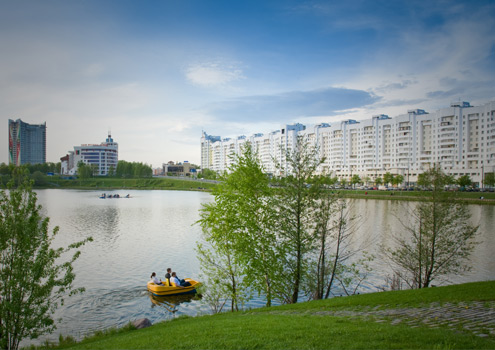Belarusian capital Minsk is Europe’s best value city break
Built as a model Soviet city after the Second World War, the Minsk of today is a stunning example of a grand Stalinist metropolis
As I stood at the top of the abandoned apartment block, ankle deep in the detritus of people’s lives, the brilliant afternoon sunshine cut like a laser into my line of sight. It almost obscured the towering, rusty ferris wheel, long forsaken bumper cars and – further into the distance – the crumbling, dormant monster of an omnipotent nuclear reactor.
It was September, 2008, and I was ‘lucky’ enough to find myself on a journalistic photo assignment to Pripyat, the long deserted graveyard of everyday life in this devastated area of northern Ukraine. Founded in 1970, this once thriving metropolis was home to the thousands of workers and their families who eked out their living at the nearby Chernobyl Nuclear Power Plant. Then, in the early hours of one ordinary day in April, 1986, it all ended. An unnecessary ‘experiment’ breached the infrastructure of reactor number four, and the wrath of hell was released on an unsuspecting world, with none to suffer more than the innocent inhabitants of the immediate area of Ukraine and south-east Belarus, where most of the deadly radiation cloud decided to lay its hat.
And here was I, photographing the remains of human beings’ lives, some twenty-two and a bit years on. Suddenly, it didn’t seem altogether right; in many ways it was a great, if maybe a little foolhardy, undertaking. But under the excitement of challenge and opportunity, I couldn’t escape one grim fact: I was only able to do this because so many had suffered and died. I can detach myself enough to appreciate the importance of documenting the area and its notorious recent history, but somehow – call it a need for good karma – something had to be given back; at that stage, I just wasn’t sure what.
Fast forward to 2009, and my discovery of the Gomel Children’s Hospital just over the Ukrainian-Belarusian border, and their need for help to save the lives of desperately ill and dying children, many from the after effects of the 1986 disaster and the still hopelessly contaminated corner of the world they were forced to inhabit. The hospital, under the dedicated auspices of Dr Oleg Zimelihin, is woefully underfunded and so, to risk killing a long story with brutal brevity, my partner and I set up our own charity, Chernobyl Heart, in the hope of raising funds to buy equipment which will allow early diagnosis and, ultimately, life-saving treatment.
And it’s this twisty, convoluted path which led us to our first trip to Minsk, which we made our Belarusian base while we awaited our cross-country train trip to Gomel, and the hospital itself.
Hailed as a modern Soviet city, you could be forgiven for thinking Minsk would be full of grey tower blocks and concrete wasteland but, in reality, nothing could be further from the truth. Nestling around the banks of the Svislach river, this bustling conurbation still lingers in the vaguest grasp of communism, but the hold on its people is more like a lank limpet than an iron fist.
In the Second World War, Minsk was the centre of the German resistance to the Soviet advance, and saw huge military activity in the first half of 1944. The resulting devastation all but razed the city to the ground, and its population was annihilated to the brink of 50,000. The peacetime rebuilding was a brave new planogram of Stalinist architecture with bold, grand buildings, broad avenues and burgeoning boulevards. The inevitable industrial growth this brought about saw one of the most impressive regenerations of post-war Europe, with Minsk’s dwindling demographics mushrooming to a million by 1972, and then a further half million by the mid eighties.
Life in the Belarusian capital today is peaceful and reasonably contented, despite president Alexander Lukashenko’s pervasive rule. Minsk remains pleasingly tranquil, and with its favourable summer climate, an undiscovered little haven for a cultural city break. Few other destinations can offer such value, particularly to the British tourist, and oftentimes it feels as if the pound in your pocket is intoxicatingly high on speed, making it difficult to actually spend a fortune, no matter what your indulgence. Hotel standards are high, our choice being the externally austere tower block of the Hotel Belarus, a facade which belies the establishment’s blissfully charming interior. Bedecked with bars, cafes and a stunning panorama restaurant affording you breathtaking views of the city in all its glory, the Belarus beautifully fuses the quaint and quirky with the modern and magnificent. From its vantage point overlooking the majestic Svislach, it’s a short walk to the poignant Island of Tears, with its recently constructed memorial monument to the Belarusian soldiers who perished in the USSR’s disastrous nine year campaign in Afghanistan. The small chapel at the centre of the island is home to figures of grieving mothers, sisters and widows, while a nearby angel weeps at his failure to protect his charges.
Dotted around the riverside walk is a plethora of bars and eateries, making for a very agreeable summer evening stroll, during which one can avidly consume the victuals and the view whilst contemplating the soft, setting sun. The atmosphere is vibrant yet never vociferous; revellers in Minsk seem instinctively to know where to draw the line.
With many highlights achievable within a leisurely traipse, most of the city can be covered in a few days. Don’t miss the Maxim Bogdanovich Literary Museum on the outskirts of Traetskae Prodmestse (the much-photographed Old Town, representing an authentic suburb of pre-Soviet Belarus) or the beautiful Holy Spirit Cathedral. Other fine churches, well worth a look, include that of Saint Maria Magdalena, St Peter and Paul (Katherine) Church, the Saint Maria Arch-Cathedral, Saint Simeon and Saint Elena Church and the ghostly, decaying beauty of Saint Roche. Independence and Victory Squares are a must, as is the wonderfully preserved little green wooden house which forms the Museum of the First Congress of the Russian Social Democratic Workers’ Party – Russia’s original Marxist party – which held its illegal founding congress there in 1898.
A city of culture and change, modern day Minsk offers the traveller a rare taste of something that little bit extraordinary; a glimpse into a truly different world, yet one which – in many ways – is just another example of a fine European city. It’s that difference you can’t always put your finger on, but one that leaves you with the unmistakable feeling that you’re altogether richer for having experienced it. As far as former USSR destinations go, Minsk is without doubt one of the most rewarding to visit.
Popularity: 48% [?]
You can leave a response, or trackback from your own site.

Got something to say..? Leave your thoughts...
4 Responses to “Belarusian capital Minsk is Europe’s best value city break”

- Chernobyl, site of the world’s worst nuclear disaster
- Sponsored Video: Longer days are coming; make the most of them with The North Face®
- Cardiff Bay Rediscovered – Torchwood Tourism
- Luxembourg City – a wealth of culture and charm at the heart of Western Europe
- Kiev, Chernobyl and Pripyat: exploring Northern Ukraine
























Interesting piece, Nige – I’m disappointed, though, that you don’t say anything about means of travel, visas etc, or how one might cope with the language difficulty. I’ve been keen for some time to visit Minsk, but I speak neither Belarusian nor Russian, and I don’t suppose English is much spoken there. Do you have any suggestions that might help?
Thanks for your comment Aidan – sorry you’re disappointed; World Travel Blog articles are aimed to be journalistic accounts rather than straightforward guides. We also can’t cover every eventuality as we have readers all over the world. However, in answer to your specific questions, you will need a visa, which can be obtained from the UK via http://www.belarussianvisa.com for just over £100. This can also be obtained from the Belarussian Embassy without the processing fee of around £30. You can fly with Czech Airlines from either Manchester or London via Prague, and I wouldn’t worry unduly about a language barrier – most people in Minsk can speak enough English to make a stay easy and pleasant. Hope this helps, and thanks again for taking the time to comment.
Nige – thank you very much for that very useful reply. The most encouraging thing is what you say about the (lack of) language barrier – that just might tip the balance in favour of me going. As a matter of interest, how would you say the ease of communication compares with Moscow, St Petersburg – or Arkhangelsk? It’s been a long-held ambition of mine to visit all these places, preferably by train.
Hi Aidan – you won’t find much of a language barrier in either St Petersburg or Moscow (especially St Petersburg, where English is widely spoken). Minsk is probably on a par with both these cities, but you might struggle a bit more in Arkhangelsk. I travelled across Siberia last year, and found places like Ekaterinburg and Irkutsk very Anglo-friendly, but once you get a little more off the well worn tracks (for example, Listvyanka, even though it’s a tourist resort) the use and understanding of English tends to peter out a little. Russian trains are a fantastic way to get around, and if you plan to do a fair bit of travelling you’ll probably end up catching overnight ones. If you want a two-berth, private cabin, you’ll need to book es veh (SV), which is first class. It doesn’t mean first class in the way we would in the UK, but simply a private, lockable berth. If you leave anything of value in your cabin while you go to the restaurant car or bar, you can securely lock it and get the attendant to unlock if for you on your return. Second class means you get a four-berth cabin (so you’re never quite sure who’ll you’ll be sharing with, but it can be fun if you’re the gregarious type!) or you can go standard class, which is a kind of dormitory.
I’d strongly recommend booking your tickets in the UK before you leave (you can do this up to 45 days in advance) as it can be very complicated to do this in Russia. You can do this through http://www.regent-holidays.co.uk or http://www.russiantrains.com.
Hope this helps and you enjoy your trip!